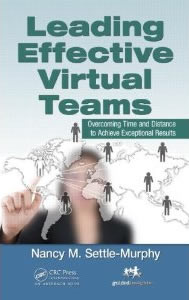Most sports coaches say that one of the hardest parts of their job is to coax the best from each player. But when some players are bigger, stronger or faster than their teammates, leveling the playing field becomes a lot tougher.
When the pressure is on, it’s tempting to put your best players on the field. After all, they won’t need the kind of energy and attention from you that your less physically gifted players will require. And your chances of winning are much better if your star performers are front and center.
Virtual team leaders face a similar challenge. Let’s take an example: Say that some of your team members work near you, maybe even on the same floor. You have worked together in the past, share a common language, and have cultivated an easy working relationship. Remote team members, however, live a time zone or two away, and since they come from other organizations and countries, you don’t share a common language or work vocabulary. The fact that your remote team members have no existing relationships with your “inner circle” increases the potential for a dramatically uneven playing field.
If you’re a virtual team leader looking for new ways to give everyone an equal chance to excel, regardless of where they are, who they know, or what language they speak, here are some tips that may help.
- Establish team norms that apply equally to all. Make sure everyone’s on the same page about attitudes and behaviors that frequently trip up virtual teams, such as making commitments, meeting attendance, use of email and instant messaging, escalating issues, and levels of responsiveness. Hold everyone equally accountable and ask all team members to do the same. Encourage people to speak up openly when they spot transgressions, even yours!
- Step up real-time communications with remote team members. After all, they are not privy to the many informal conversations you’re probably having regularly with team members close to you. Schedule time with them regularly to catch up and check in 1:1, or in small groups. Your local team members probably pick up a lot of information by virtue of being close to you, so they may not need scheduled 1:1 meetings quite as frequently, since you have other ways to catch up.
- Provide important information to everyone at the same time. You may be dying to tell that really big news to the people closest to you first, but don’t. Information is power, and you need to parcel it out equitably. Alert everyone that you’re calling an urgent meeting to share important news, and make sure the time is reasonable for most people. (If you plan to share slides or other documents during your meeting, make sure everyone has the right access codes so there’s no delay.) As a rule, make information of all kinds equally accessible to all team members, which means establishing a shared area where everyone can contribute and retrieve up-to-date information easily.
- Leave behind the conference room. Even though you may be able to convene your local team members in a conference room for your team calls, avoid doing so unless there’s a compelling reason, such as having video equipment available only in your conference room. Otherwise, if you have one set of people in a room together, and the rest participating in relative isolation, it can increase the feeling of alienation and perceived disadvantage. (If remote team members are also gathered in conference rooms, that’s a different story.) The guiding principle: Give everyone the same opportunity for making contributions and participating fully.
- Dole out desirable projects evenly. When there’s a lot on the line and things must go perfectly, you may want to give that highly-visible project to someone you know and trust implicitly. But, think about the message you’re sending to others when the best projects go to “your favorites” every time. It’s true that someone else may need a lot more of your time and attention to take on new work, but ultimately, that’s the only way they’ll become more self-sufficient. Keep track of who’s taken on which projects, and make sure you have given every deserving person an equal chance to shine.
- Shift power, roles from time to time. You really don’t have time to do it all. So why not thoughtfully delegate some responsibilities for leadership across your team? For example, try asking people to take turns facilitating team meetings, or synthesizing team reports. Perhaps others can represent your team when collaborating with other organizations. Make sure you don’t simply delegate the unpleasant, tedious administrative tasks to your team. Give them something interesting to do, which offers real opportunities for learning and growth. Be prepared to allocate some extra time for needed coaching.
- Modify group discussions to accommodate differences. For starters, this might mean rethinking your meeting times, especially if you are always asking your Asia Pacific folks to participate at 5 AM or 11 PM local time. Enable people to participate using both voice and visuals. Some people communicate better in writing and some verbally. Multiple communication channels are especially important when people use different native languages. You also may need to allow more time for discussions to paraphrase and test for meaning frequently. In a virtual world you can’t see confusion or disagreement (unless you’re using video), and it simply takes quite a bit more time to pause, reflect and restate to insure a shared understanding.
Many remote teams have a “hybrid” component, where some team members are co-located with the leader while others work from a distance. Virtual team leaders must take extra pains to make sure that their remote team members feel equally valued, appreciated and needed. They will require more time and attention from you, at least early on, but if you can find meaningful ways to create a level playing field, you’ll have a far stronger team.




